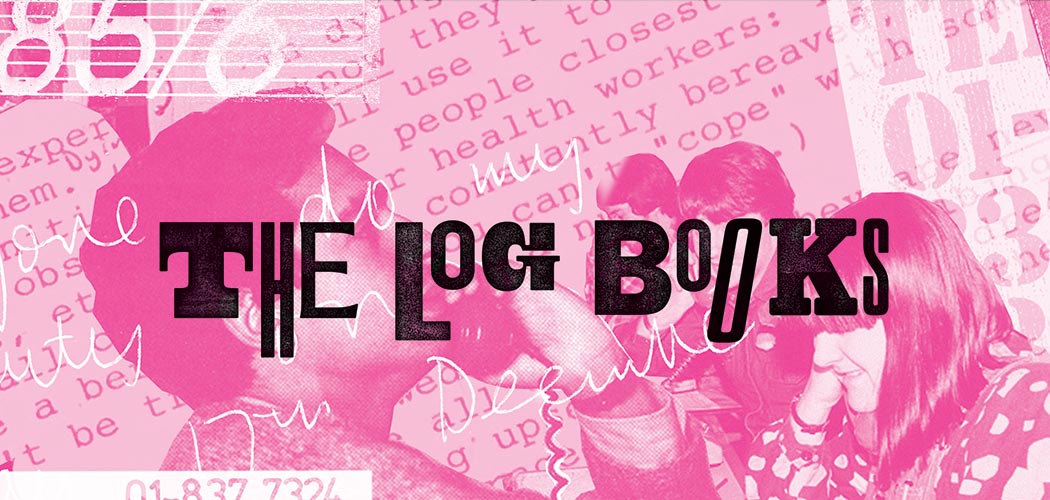The Log Books podcast is a history of LGBTQ+ life in Britain as noted by volunteers at the helpline Switchboard. Each episode centres around log book entries made by the volunteers who staffed the phones from the charity’s first day in 1974. Now held in the archive at the Bishopsgate Institute, the volunteers’ log books offer a unique insight into the range of issues facing LGBTQ+ people in Britain in the 70s, 80s and 90s. The first eight episodes of The Log Books podcast cover 1974 to 1982. We asked co-producer Adam Smith who hosts the podcast with Tash Walker, a trustee of Switchboard, to tell us more about these remarkable stories from our history.

If America’s best story of queer liberation is the night when the folks at Stonewall started a revolution by resisting a police raid, what is the UK’s?
Here is one candidate. In 1971, a sixth-form student named Julian invited a representative of the Gay Liberation Front to a debate in his school in London. The nascent GLF were inspired by the revolution in sexual rights activism in America after Stonewall. Their loud protests had begun to upset the straight mainstream. So Julian’s headmaster refused to allow them to appear. “I was expelled from school for being a corrupting influence on the younger pupils,” Julian says. He quit education, and moved into the GLF commune in Notting Hill Gate. Or, as he says it, “I ran away from home and went off to join the circus.”
The start of Julian’s revolution had all the ingredients of queer liberation. He shook off the establishment, found a family, and began to live alternatively. The UK’s history is filled with stories like Julian’s. And there is a treasure trove of these untold stories laid down in the pages of the log books at Switchboard – the LGBT+ helpline.
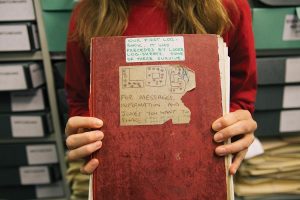
Since volunteers began taking phone calls in 1974, Switchboard has helped many thousands of people on matters of gender identity and sexuality. Julian Hows became one of the phone operators who made detailed notes in the charity’s log books (and has been an AIDS activist for decades). The notes helped volunteers to discuss from one shift to the next how to handle certain topics, and to track what kinds of calls were being received (now Switchboard uses a computer system).
In the 70s, many calls were from runaways:
April 9th, 1978
Paul was originally from Leicester and phoned this evening to say he has just been released from hospital after being admitted for trying to commit suicide. He says he is destitute. I have given him three hostels and told him to contact Social Security tomorrow. Paul had come to London because he was ridiculed.
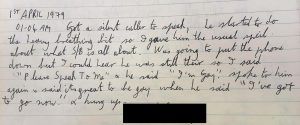
A new podcast called The Log Books delves into stories like the one above and the memories of more than 40 contributors like Julian. The project covers 1974 to 1982, the year of an entry that reads:
I had a call from a 19-year-old TV [transvestite] in Ashford who had been thrown out of home this evening by his parents who had just ‘discovered’… Luckily he seemed reasonably together about his situation and was reconciled to spending a night in his Mini.
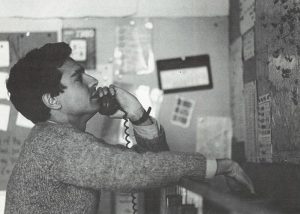
Language aside, this story sounds very contemporary. But there are plenty of stories in the log books that show just how much things have changed for queer people. Today it is easy to find options for nightlife via Google, Instagram and Facebook. In the 70s, says former Switchboard volunteer Femi Otitoju, “a really large proportion of our calls were about people looking for somewhere to go”. The volunteers devised a system of maps with colour-coded pins so they could easily locate options in different parts of the country when someone phoned with a question. “You had to leap up,” says Femi, “and your geography had to be good. ‘You’re in where? Oh OK! Weston-super-Mare? Nope sorry, there’s nothing there!’
The log books were a vital resource for Switchboard to track punters’ experiences of various pubs and clubs:
April 19th, 1975
Chagueramas reported not gay at all. Straights have been making comments when gays dance together. Gays have been huddled together in a corner so they will feel ill-at-ease.
Huddling together can lead to sex – the focus of many calls. The podcast is full of stories and memories from people who wanted to talk about sex. In one wonderful retelling, Lisa Power (co-founder of the charity Stonewall) remembers having a heated exchange with another volunteer in the pages of the log book over double-ended dildos. “I just completely refused to believe that such a thing existed,” she says in the podcast, “but of course it did… I actually ended up running the first lesbian sex toy mail order business in the UK.”
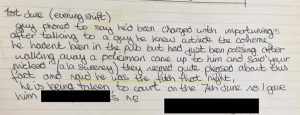
The untold stories in The Log Books podcast include a straight male sexual health doctor learning all about bottoming from a sailor who needed treatment. There is also the lesbian who fought for custody of her son when lesbians were not seen as credible mothers. And stories of discreet trans people who would take the train to another town just to walk around more safely in the clothes they felt most comfortable in.
Perhaps the most poignant are the stories of the men who were arrested for sex offences, such as soliciting or importuning – that is, chatting someone up. “It was all rather scary,” recalls one contributor to the podcast, about how men were arrested in parks. “You were told, ‘I’ve got a big torch in my pocket and if you make the slightest move to get away, you’ll get it across the neck’.”
The log books are filled with stories of raids on private parties and saunas, and arrests made in parks or lay-bys. “It was bullying,” says Lorraine Moir, a retired police officer and podcast contributor, “No doubt about it.” Her words remind us that there is plenty of this abuse of queer people today: in the workplace, the schoolyard, the street – and to great extremes in other countries around the world.
But we have our stories. By remembering the stories of the heroes who were out before us, we can continue to fight prejudice.
For more info about The Log Books podcast, including where to listen and subscribe, visit thelogbooks.org.



